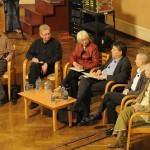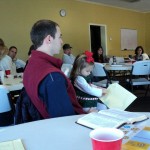Opportunities for the church in Maine
Dan from “The Ekklesia in Southern Maine” is now writing for Examiner.com as the Portland, ME Religion and Politics Examiner. (More power to him… I try to stay out of politics and religion as much as possible…) He’s recently written a very good article called “LePage’s budget cuts to refugee welfare open opportunity for the Gospel.”
Dan explains the the governor of Maine is planning to cut welfare support for legal immigrants out of the budget. I love Dan’s response! Instead of calling the government to care for legal immigrants, Dan says the church should step up and care for these refugees and strangers/aliens (that’s what Scripture calls them).
Dan says:
If funding was cut and The Church took on this responsibility and Maine continued to be a welcoming place to refugees what would that say about Christ? What would that say about Christianity? It would speak volumes. It would show in action, not just words, that Christianity is about love, Christ’s love demonstrated at the cross, and his followers love for their God and their neighbors. It may lead to refugees finding hope beyond physical sustenance and safety; they may find eternal hope in the Gospel.
Yes! Great article, Dan! Unfortunately, I’ve found that the church tends to ignore or complain about issues like this.
I’m praying the church in Maine will step up and show the love of Christ to those that the government is refusing to help.
Arthur and Bob
Arthur at “The Voice of One Crying Out in Suburbia” has a problem. You see, in his latest post “Be Like Bob,” Arthur describes a church leader named Bob who helps a church begin serve God and serve others for themselves.
According to Arthur, the church begins to take part in living the gospel (that’s what it is, by the way), that soon Bob doesn’t do everything anymore, and he can work and support his family and others without needing monetary support from the church.
So, what is Arthur’s problem? He wants to follow a guy like Bob, but he doesn’t find many “Bob’s” in the church today. (By the way, I like following people like Bob.)
Here is how Arthur describes Bob and his work among the church:
After a year or two [of Bob equipping and training others to serve], perhaps 4 or 5 of the men of the church have advanced in maturity and are regularly ministering to the needs of the believers in this local church. The church recognizes these men as elders and they begin to shoulder an increasing load of the ministry in the church, again both to “members†and to the community in addition to their secular jobs. As the newly recognized elders help to minister and equip in the local congregation, Bob has more time freed up and is able to work his regular job on a full-time basis. Bob no longer accepts a regular salary from the church. The $400 the church had been paying Bob while he was laboring in ministering and equipping is now freed up so the local church decides to donate all of this to local and global ministries engaged in spreading the Gospel and works of mercy. Bob spends more time at his “regular†job and thus more time among unbelievers than in his office at the church.
Read Arthur’s post… compare it to what you find in Scripture. (I can find Bob in Scripture.) Compare it to what you find in the church today.
Where are all the Bob’s?
The connection between worship and service
It is possible to go through motions that are called “worship” (singing, praying, preaching, professing, etc.) without actually worshiping God. It is possible to think you are worshiping God without actually worshiping God.
It is possible to do things for others that are not actually serving in Jesus’ name. It is possible to feed, clothe, care, and heal without doing so in the power that God provides and without giving honor and glory to God through Jesus Christ.
However, it is impossible to actually worship God without serving others. The two go hand in hand.
The Israelites did not understand this connection. So they dutifully carried out the rules and regulations of the sacrificial system while ignoring the needs of the people around them. God did not consider this worship, even though the Israelites thought they were worshiping because they were doing the right things.
In fact, on some occasions, God told them to stop offering sacrifices and stop observing the feasts (that he instituted) until they first learned to care for those around them. (See Isaiah 1:11-17 for one example.)
Similarly, in the NT, we see examples of Christians carrying out the “practices” as they should, but the practices were worthless because they were not caring for the people around them. (See 1 Corinthians 11:17-34 for one example.)
As James wrote, any kind of faith does not include helping a brother or sister who is in need (actually helping by doing something to alleviate that need) is in reality dead faith. John wrote that someone who do not love (in action, not just words) his brother or sister does not love God. These are strong words. We should consider them very carefully.
Also, consider the famous “love chapter” in 1 Corinthians 13. Paul begins by saying that all of our offerings of spiritual gifts (prophesy, tongues, giving, faith,… and you could include any gift here) are nothing if they are not exercised with love. Now, look at his description of love in 1 Corinthians 13:4-7. Everything in that list is related to how we treat other people!
We can close our eyes while we sing. We can rise early in the morning to pray or pray seven times per day. We can listen to sermons all week long. We can teach Sunday school or even preach sermons. We can put vast sums of money into the collection plate or give to support missions. But, if we are not caring for and serving and helping the hurt and lost and needy around us, then we should not call these things “worship.”
Daily, sacrificial, authentic, missional living
Mark at “renrutkram” has written an excellent post called “What is ‘outreach’?”
While Mark recognizes the “big events” in scriptural examples of proclaiming the gospel, he says these one times events (Paul preaching at Mars Hill, for example) are always combined with relationship and community which is “evidenced throughout the Scriptures.”
How does that apply to us today? Should community and relationship be evidenced throughout the church today? Yes, even though it is difficult. Mark says:
In my own life, daily discipleship is much harder than one-time events. I don’t particularly mind large, attraction-based, event-oriented evangelism (though I question their effectiveness in today’s culture). However, one-time evangelism must be accompanied by daily, sacrificial, authentic, missional living. I find it much harder to mentor a student weekly than take teenagers to camp once a year. It is much more time-consuming to volunteer in the local middle school than throw a Superbowl party. I have to be vulnerable when I share my life with other people and that scares me. When you share life you share success and failure, strengths and weaknesses.
By God’s grace I will strive to demonstrate the gospel not just once in a while but every day.
Yes! Do you want to host a “big event”? Great! But, do you have the “daily, sacrificial, authentic, missional living” that must go along with it? If not, then the “big event” will soon fizzle into a faded memory.
But, with “daily, sacrificial, authentic, missional living” the gospel is brought to bear on everything that we do, with or without a “big event.”
It’s not easy. In fact, it is absolutely impossible, which is why God works through us in his power when we serve others for him.
Is it all just talk?
Sometimes, when I write blog posts or comment on other blog posts or even respond to comments on my posts, it seems like it’s all just talk. I wonder, “Are we all just talking to each other, or are the posts and comments actually helping people change?”
Last week, Keith at “subversive1” published his posts called “How to Start a Ministry to the Poor in your Community.” I linked to his articles in my post “Jesus will lead you to ‘the least.’” (Several other people linked to Keith’s articles too.)
In response to the comments on my article, Dan at “The Ekklesia in Southern Maine” wrote a post called “A Conversation on Reaching Out.”
So far, it’s still all just talk. That is, it’s all just talk until you read the comments on Dan’s post. This is what Jeremy and Dan write:
Jeremy:
By the way…based on what both Alan and Keith said, I think I may have already found a place to get involved with. It’s a ministry for the children of migrant workers. We are very excited about it, and hope it works out.
Dan:
Based on that conversation and some stuff I had been thinking about we are going to get involved by providing people with heating oil. That is a major difficulty for families this far north, especially considering it costs over $3 a gallon right now.
I figure that is a good way to apply those principles to our situation, living in the woods in Maine.
This is awesome! It’s not just talk when we actually change what we’re doing!
And, to all of this, I say: To God be the glory! And, I thank him for the opportunities that he’s given me, Keith, Jeremy, Dan, and others to serve people in the name of Jesus. I pray that he continues to give us opportunities and strength and a desire to serve him by serving others, and that he uses our efforts to produce fruit and build his kingdom!
Jesus will lead you to “the least”
So, here’s the deal. If you’re following Jesus, he will lead you to “the least.” (If you don’t know who “the least” are, then please read Matthew 25:31-45.)
Where Jesus certainly answers a few theological type questions, I don’t see examples of him sitting around for house discussing the minute details of a specific theological issue. (Perhaps that’s only because he couldn’t get enough people to come to his conference?)
Anyway, I know that everyone and their sister is linking to these posts written by Keith from “subversive1,” but I want to link to them too, in case you haven’t seen them:
How to Start a Ministry to the Poor in your Community: Part 1, Part 2, Part 3, Part 4, and Part 5.
Perhaps you are already serving the poor, the hungry, the thirsty, the unemployed, the elderly, the orphans, etc. in your community. Great! Please write about it so that others can follow your example. (Many Christians have NEVER seen an example of other Christians serving “the least.”) However, if you are not serving others, then why not follow some of Keith’s suggestions?
By the way, you may disagree with the way that Keith is serving, or you may disagree with the way that I’m serving, but if you are not serving “the least,” then our ways are much, much better than your way. So, if you want to disagree, do so with a lifestyle of service and not just your words.
What surprises me…
Earlier today, I published a post called “Why are they surprised?” This post is actually a follow up to that post.
You see, not only were the people that I talked with surprised (if you don’t know what I’m talking about, please click the link above and read the previous post), but there were a couple of things that surprised me as well.
First, I’ve lived in this area for over eight years. I’ve lived in this same small town for almost five years. But, until last year, I had never heard of this food pantry. Until a few months ago, I did not know the extent of the work done through this food pantry. I did not know that 300+ families came to this church building every other week looking for help.
This surprises me. Another brother who was with me said the same thing. He had never heard of this food pantry until I told him about it a few weeks ago. We talked to the lady who organizes the food pantry. We’re trying to get the word out.
But, something else surprises me – although it is somewhat related to the first thing. With over 300 families coming by this church building every other week, why are there so few Christians involved? Now, like I said above, I’m sure that many Christians in this area are like me and my friend in that they have never heard of the food pantry.
But, the church that hosts the food pantry is one of the largest churches in the Raleigh area with thousands of members. Plus, many of the members of that church attend a local seminary which boasts over 2000 students (one of the largest seminaries in the country). So, again, where are all the Christians willing to give up a few hours every other week to serve those in their community who are in need?
In fact, the food pantry makes it easy for these Christians. The needy people are coming to them!
This surprises me, too.
My friends who are organizing the food pantry have helped me with the first “surprise.” I hope that my exhortations and the example of my family and friends help alleviate the second surprise.
Why are they surprised?
As some of my readers know, my family and some friends from the church have been helping out in a food pantry that is hosted by another church. The host church is quite different (ecclesiologically) than we are. But the people who are running the food pantry have invited us and welcomed us to help them serve the people in our community and the surrounding areas.
Now, alot of people work very hard to provide food people who come to this food pantry. My particular assignment is to spend time talking with as many of the 300+ families to come to get food. As we talk, they often ask me about myself or about the host church. They are usually surprised by my answers. Recently, I was thinking about this, and I began to wonder why they were surprised.
Why are they surprised when they find that I am not part of the host church?
Why are they surprised when they find that I am not paid to be there (not on staff)?
Why are they surprised that I work a normal job just like them?
Why are they surprised when I praise the people who are part of this host church?
Why are they surprised that several of our small church are working at the food pantry?
Now, it might be easy to answer the questions above in a way that blasts our current church structure and culture. But, let me ask you something…
Are we doing anything to alleviate those surprises? Are we seeking to work together with other believers (who may be part of radically different churches) to show people that we really are united? Do we expect our paid staff to do more than everyone else?
Are they surprised because we are part of the problem?
Who should teach?
In his latest post, Eric from “A Pilgrim’s Progress” presents another article in his series on house church: “House Church – Teaching.”
(By the way, it should be mentioned that Eric is presenting a particular form of meeting as a “house church.” All house churches do not follow what Eric is describing.)
In his post, Eric presents scriptural evidence that elders should teach, those gifted as teachers should teach, and others should teach as well.
I like the way that he concludes best of all. Eric points out that while teaching with words is important, teaching through actions is usually more effective:
Teaching, then, ought to be more than just verbal instruction. Â Teaching is most effective when it is experienced. Â Therefore, in the life of the church we best teach and are taught through both hearing and doing. To follow the model set forth by our Lord, we teach and learn through service to others.
In fact, I would say that teaching with words becomes effective only when it is combined with teaching through actions.
What do you think?
James is not speaking of theological concepts
Last week, Arthur from “The Voice of One Crying Out in Suburbia” returned from a trip to Haiti where he was working with orphans. He talks about that trip – and some of the orphans that he met – in a post called “Beoda.”
Arthur’s post is primarily about an 11 year old boy named Beoda who lost his father in the earthquake last year. Apparently, spending time with Beoda and other orphans taught Arthur a very important lessons:
I asked Beoda and another young boy, Stevenson, to write their names in the small Bible I brought with me on the page facing the first chapter of James to remind me that James is not speaking of theological concepts to be debated in the ivy covered halls of academia. He was speaking of real people, real orphans who had their lives turned upside down. Real widows who lost their husband and often had children to care for in a very different, very difficult world. James was writing about Beoda and Selene, about Stevenson, about Kimberly.
Yes. YES! We MUST move beyond theological concepts.
What do you think about when you think of “love”? Do you think of people or concepts? What about service or discipleship or missions? What about orphans or widows? What about the least of these?
If we are still thinking only in terms of theological concepts and if we are not truly living these things among real people with real stories and real names, then we do not understand them at all.










